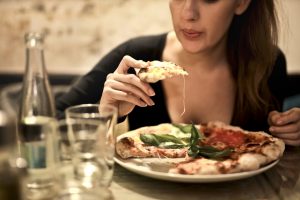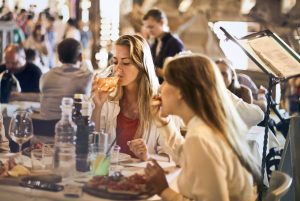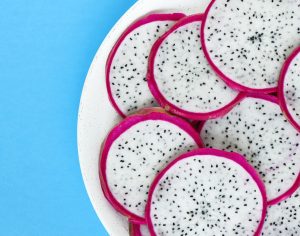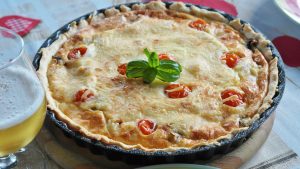When writing food scenes, the eating and drinking are seldom central to advancing the plot, so people have coffee and cake or do lunch, and all the plot and character development are carried by the dialogue. Such dismissal of eating/drinking habits is a big opportunity missed.

“Food-ology links FOOD RELATED HABITS to PERSONALITY TRAITS and BEHAVIORAL TENDENCIES. A PORTAL INTO THE LAYERS OF ONE’S CHARACTER. Learn more about yourself and those around you – to support better judgment, improve relationships, increase effectiveness and empower your life. You are HOW you eat.” ~ Juliet A. Boghossian, Founder, Behavioral Food Expert
Juliet Boghossian is a self-styled behavioral food expert. Her research has spanned 20 years. She’s cited all over the place, so here are her major assertions about eating style and personality. Now, in the interest of full-disclosure, I admit that I read secondary sources. I couldn’t quickly find Boghossian publications. (Make of that what you will.)
The slow eater. According to Boghossian, slow eaters usually prefer to be in control, and they know how to appreciate life. They’re also likely to be confident and even-keeled. Perhaps they put themselves and their needs ahead of others, are selfish, and do not give priority to others.
The fast eater. Fast eaters tend to be ambitious, goal-oriented, and open to new experiences. They may tend to be impatient. May come across as overly competitive. Often finish tasks ahead of deadlines. May be considerate, putting others ahead of their own needs.
The adventurous eater. These people never meet a food they don’t want to try. This person is probably a thrill-seeker and risk-taker in other areas of life, willing to try new things, maybe beyond his/her experience/comfort zone.

The picky eater. Does this really need definition? People who hesitate to try new food, continue childhood food preferences, etc. According to Boghossian, picky eaters are likely to be a little neurotic in general.
Julia Hormes, psychologist specializing in food behaviors at SUNY Albany, notes, “Research on ‘food neophobia’—the reluctance to try new foods—shows that it is related to certain personality traits, including sensation seeking, anxiety, and neuroticism. Those high in food neophobia appear to associate many avoided foods with a sense of disgust.”
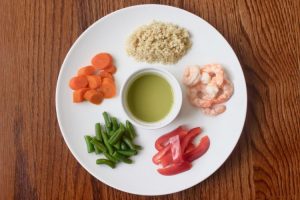
The isolationist. These people eat all of one food before moving on to the next food, and so on around the plate. According to Phil Mutz, author of the LittleThings post, “You are a very detail-oriented person, and you are sure to always think things through thoroughly… You are a very careful person.”
Boghossian says, “This behavior conveys a task-oriented personality versus a multi-tasking individual. …Also, it conveys a disciplined and borderline stubborn tendency to complete one task before moving on to another.”
Earlier this year, Tastessence presented opinions on these and other eating habits. They discussed the personalities of people who adapt their eating speed to match the pace of companions, change eating pace based on schedule, experiment with food combinations, order without looking at the menu, take a long time to order, cut all their meat portion at one time, make noises while eating, ask questions about the menu, refuse to share food, and/or keep foods from touching each other. If any of these variations are of interest to you, look it up.
In the meantime, I will turn to findings published in the journal Appetite. This is by researchers at the Swiss Federal Institute of Technology, who maintain that personality informs eating habits. This was a serial survey study of nearly 1,000 participants (not college students). They researched what psychologists have put forward as the five basic dimensions of personality: openness, conscientiousness, extraversion, agreeableness, and neuroticism.
So, in a reversal of the above, here are the five personality types and what their eating habits are, according to who scored high on a personality dimension.
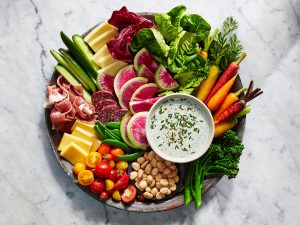
Openness: More likely to stick to a healthy, balanced diet, like the Mediterranean diet; not a huge red meat fan; more likely to have a plant-based diet, perhaps including fish; eats lots of fruits and vegetables.
Conscientiousness: Likely to seek information, control stress factors, and adopt behaviors with health benefits; less likely to eat meat; more likely to be a restrained eater; does not eat emotionally; prefers fruits and vegetables to sweets.
Extraversion: Social, good at networking; engages in social eating, so more likely to respond to external food cues (like smell); eats more meat, sweet foods, savory foods, and sugar-sweetened drinks.
Agreeableness: Less likely to consume meat, but otherwise no significant correlation between this personality dimension and most food choices.
Neuroticism: Diet only when convenient, eat to cope with emotions; tend to eat “comfort foods,” not so many veggies, and fewer whole grains.
Bottom line for writers: Make more of your food scenes! Whether it’s your protagonist or another character, use their eating habits to establish and deepen the portrait of their characters.
As the great communicator once said, “You can tell a lot about a fellow’s character by the way he eats jellybeans.”
